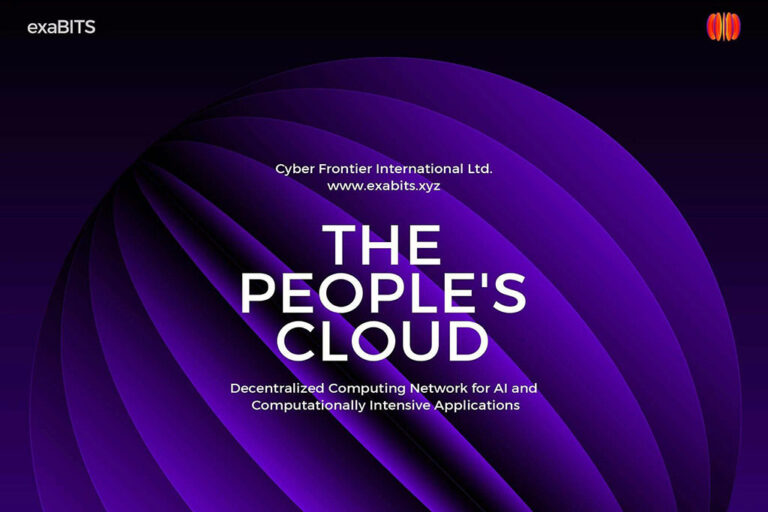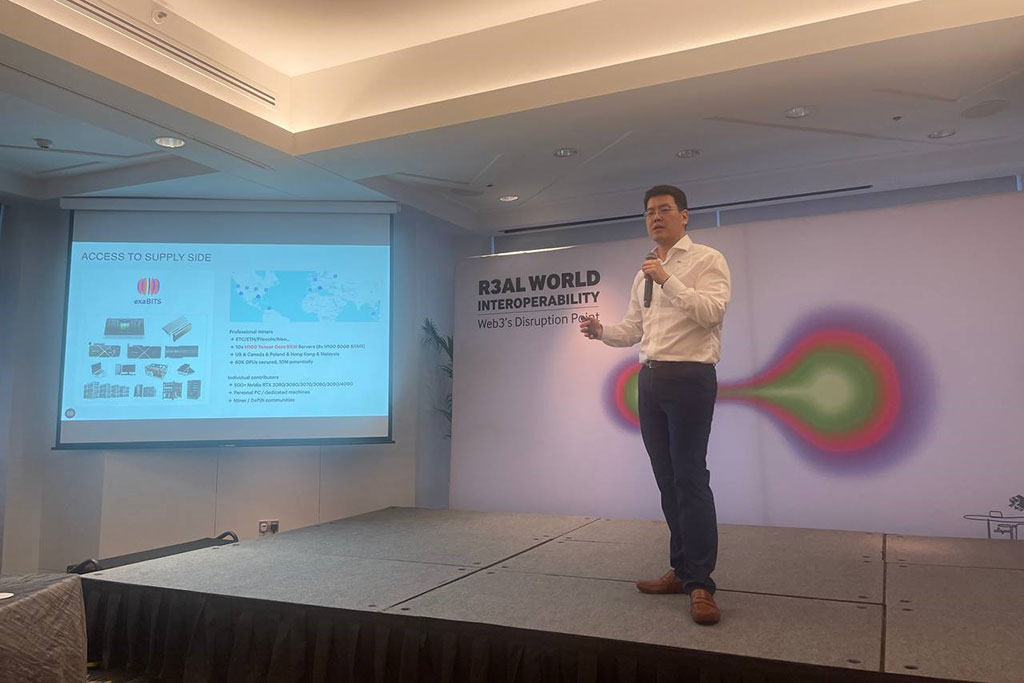
exaBITS: Pioneering a Revolutionary Upgrade in Computational Power Paradigm

Recently, OpenAI announced the official launch of the Android version of ChatGPT. Currently, Android users from four countries – the United States, India, Bangladesh, and Brazil – can download the application. With the introduction of ChatGPT on mobile devices, AI applications are reaching a larger user base. Hundreds of AI large models have already been deployed globally, powering a multitude of AI-based applications.
AI is experiencing an explosive growth at a visible pace, but the foundational computational power that drives its development cannot undergo exponential growth in the short term. Traditional approaches to computational infrastructure take considerable time and rely on substantial investments in physical assets. However, the demand for computational power is growing explosively.
According to Roland Berger’s predictions, from 2018 to 2030, the per capita computational power requirement in major countries will increase 20-fold from the current level of less than 500 GFLOPS, reaching 10,000 GFLOPS by 2035.
Following the energy race, what might be the next target of contention in human society? Computational power.
However, traditional centralized methods of building computational infrastructure are no longer suitable for the needs of this new phase. How can we respond to the exponential growth of computational demand quickly? How can we intelligently allocate computational resources? How can we provide more stable and cost-effective computational services? The solutions to these challenges mainly involve two directions: revolutionary advancements in computational technology, such as quantum computing and photonics computing, and innovative changes in computational structure, such as edge computing and distributed computing. The former undoubtedly brings about a fundamental revolution that transcends civilization stages, but it requires an extensive period of research and development. The latter, while also requiring specialized algorithms and technologies, can be implemented in the shortest time frame with existing hardware conditions.
exaBITS: Leading a Paradigmatic Revolution in Computational Power
In the face of the seemingly impossible task of balancing costs, usability, and capacity, distributed cloud computing presents a solution to the computational power demands driven by AI growth. On one hand, the supply of computational power can be distributed, creating a decentralized network that not only conveniently and flexibly provides computational services to AI applications but also ensures non-stop operation due to its decentralized nature. On the other hand, computational infrastructure can be open, meaning that through new socialized business models, the collective effort of all humans can contribute to building a limitless global computational network.
To achieve this solution, exaBITS proposes an open AI ecosystem based on distributed cloud computing. Technologically, exaBITS employs Elastic Training Technology, which breaks down complex AI computations into minimal executable tasks. These tasks are then intelligently matched with the most efficient computational nodes from the network using the Atomic AI Scheduling System.

In this process, the most challenging task is not the task decomposition, but rather the task aggregation. exaBITS achieves this through Computing and Network Convergence, reassembling computations completed by multiple nodes – sometimes even hundreds of nodes – into a complete data package that is returned to the application, earning rewards in return. Throughout this process, exaBITS’ Beacon network maintains records on the blockchain and distributes rewards to computational nodes within the system.
Protecting Privacy from the Ground Up
As AI products are widely commercialized, an increasing amount of personal and business data is being centralized in these AI product servers. Many companies have explicitly prohibited the use of tools like ChatGPT as everyday office aids for employees due to the critical importance of information security over marginal improvements in work efficiency.
This presents a dilemma: how can we simultaneously fulfill the massive data requirements for AI training while ensuring the security of personal and corporate information? In theory, any centralized collection, storage, and computation carry the risk of data leaks.
Therefore, only decentralized distributed computing and storage can fundamentally enable private AI. Private AI refers to models trained with algorithms in specific users’ or organizations’ private environments. When you use machine learning to train a model on a dataset, like a company’s sales data or user distribution tables, that model remains confined to your use and your company’s use. The AI platform won’t acquire and use this information to train open models. Thus, your data won’t be exposed, and the data you provide won’t assist your competitors.
While many teams are currently developing Private AI applications, without a foundation of decentralized computing and storage, regardless of how applications are encrypted or isolated at the application layer, genuine Private AI cannot be truly achieved.
exaBITS provides the foundational structural support for building Private AI. At the computation level, exaBITS already distributes fragmented information and data to nodes across its computational network, where each node is unable to access the complete dataset. Only when aggregated for computational demand does this data become meaningful; at any point in between, only useless data fragments are available.
It is foreseeable that, as AI becomes more deeply integrated into human daily life and work, Private AI that ensures privacy and security will be the only viable direction. The decentralized distributed computing network represented by exaBITS is poised to completely replace existing centralized servers and cloud computing models in this field.
Socialized Multilevel Construction
AI is growing exponentially, but its required computational power cannot keep up with traditional methods. This is where exaBITS introduces a structurally innovative development model: a socialized multilevel construction, replacing traditional centralized corporate-based construction.
This model is simple to understand: by utilizing personal computers, even smartphones, specialized computational bases, or integrating existing data centers into the exaBITS network, theoretical participation from everyone in the construction of a distributed computational network is achieved. This democratized construction model swiftly aggregates all available computational power in society and, fueled by economic incentives, supports the development of new computational power.
For an AI-driven world that promises transformative efficiency gains for humanity, the construction and support should come from the collective efforts of all humans, and their rewards should stem from the progress brought by this revolutionary construction.
It has been reported that exaBITS has already completed tests for decentralized access and may soon release a testing network, allowing desktop computers and even smartphones to contribute to the global AI computational network experience.
Building a Business Ecosystem on Blockchain
exaBITS’ open AI ecosystem offers a comprehensive approach for individuals to companies to participate in its construction. To ensure the healthy functioning of this ecosystem, exaBITS bases its governance and business mechanisms on blockchain, utilizing mutual verification between computation tasks and distributed ledgers to maintain automated operation of the entire commercial structure.
exaBITS aims to create a world where suppliers, users, and developers collectively expand the potential and share profits. This vision is rooted in the belief that the growth of the AI industry should benefit all stakeholders, not just a few.
Traditional cloud computing business models are unsustainable for a healthy AI ecosystem. They squeeze profits for both supply and demand sides, increase entry barriers for users, and limit the contribution capabilities of developer communities. Especially as the future of commercial AI remains uncertain, with many open-source projects focusing on profit generation struggling, traditional cloud computing providers have become pivotal in restraining the progress of the AI civilization. It’s worth noting that the largest traditional cloud computing service provider, AWS, boasts a gross margin of up to 61%, underscoring its excessive control and exploitation of the entire ecosystem.
The open-source model offers potential solutions to these issues. By encouraging cooperation, transparency, and monetization, it can lead to a more sustainable and vibrant AI ecosystem. Consequently, a paradigm shift in the cloud computing business model is necessary to continue driving the growth and development of the AI ecosystem.
Developers play a crucial role within the AI ecosystem. To support them, exaBITS aims to provide long-term stability through computational resources and various incentive measures. This support seeks to foster the development of the open-source community and contribute to the flourishing of the software ecosystem required by the AI industry.
Presently, after eight years of research and algorithm training in traditional industries, exaBITS has completed the core Elastic Training algorithm system. The seemingly incredible vision of an open AI ecosystem has already taken shape. With increasing support from the capital market, the era of universal participation in constructing the AI computational network will begin. An inclusive and sustainable AI ecosystem will emerge from the paradigm shift in computational infrastructure led by exaBITS.
Disclaimer: This publication is sponsored. Coinspeaker does not endorse or assume responsibility for the content, accuracy, quality, advertising, products, or other materials on this web page. Readers are advised to conduct their own research before engaging with any company mentioned. Please note that the featured information is not intended as, and shall not be understood or construed as legal, tax, investment, financial, or other advice. Nothing contained on this web page constitutes a solicitation, recommendation, endorsement, or offer by Coinspeaker or any third party service provider to buy or sell any cryptoassets or other financial instruments. Crypto assets are a high-risk investment. You should consider whether you understand the possibility of losing money due to leverage. None of the material should be considered as investment advice. Coinspeaker shall not be held liable, directly or indirectly, for any damages or losses arising from the use or reliance on any content, goods, or services featured on this web page.




